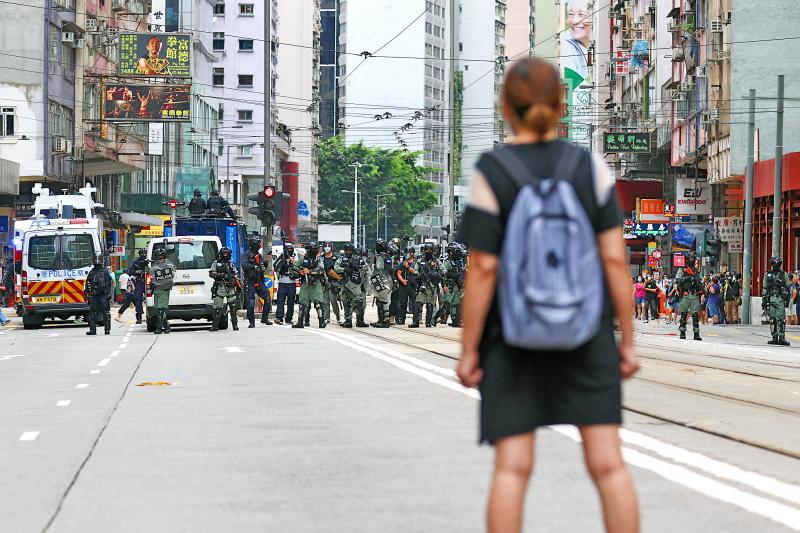Hong Kong protesters yesterday battled with riot police in busy downtown areas, showing their opposition toward China’s dramatic move to crack down on dissent in the biggest demonstration since the coronavirus swept through the territory in January.
Police deployed a water cannon and fired tear gas in the Causeway Bay shopping area after hundreds of protesters had gathered to oppose new national security legislation from China.
Police warned the crowd they were taking part in an illegal gathering, and later said in a statement that “rioters threw umbrellas, water bottles and other objects at them.”
At least 120 people were arrested, mostly for illegal assembly, while at least four members of the police media liaison team were injured, according to a post on the police’s Facebook page.
“We must stand up and fight, and let Beijing know that we will never surrender,” said Joshua Wong (黃之鋒), one of the territory’s most prominent advocates, adding that the national security law was even more damaging than an extradition bill that spawned six months of often-violent protests.
“We would describe it as the beginning of the end,” he said. “We don’t have enough time, but we still need to continue the fight.”
More protests are planned for later in the week, when Hong Kong lawmakers are set to consider legislation that would punish anyone who disrespects China’s national anthem.
In Beijing, the annual session of China’s legislature is expected to ram through a law to prevent and punish any acts of “secession, subversion or terrorism” in the territory that threaten national security.
The developments have opened another front in US-China tensions.
US Secretary of State Michael Pompeo said the US is weighing how to respond to China’s national security laws, which he called a “death knell” for Hong Kong autonomy.
Options include sanctioning Chinese officials, tariffs on Hong Kong goods and banning sensitive technology sales to the city.
Chinese Minister of Foreign Affairs Wang Yi (王毅), who spoke in Beijing during the Chinese National People’s Congress (NPC), said the matter was an internal affair.
He said it was necessary to stop separatists, independence advocates and external forces backing “violent and terrorist activities.”
“It has come to our attention that some political forces in the US are taking China-US relations hostage and pushing our two countries to the brink of a new Cold War,” he added.
“It [the security legislation] will not affect the high degree of autonomy Hong Kong enjoys, nor will it affect the rights and freedoms of Hong Kong residents, nor will it affect the legitimate rights and interests of foreign investors in Hong Kong,” Wang said.
Hong Kong officials, including Hong Kong Financial Secretary Paul Chan (陳茂波) echoed those comments, trying to allay fears the moves will threaten confidence in the financial sector. Local business groups, including the American Chamber of Commerce, have voiced concern about the “vaguely defined” law.
“An NPC announcement that it will bypass the Hong Kong legislative process to enact a Hong Kong security law may jeopardize future prospects for international business, particularly if a long list of details are not spelled out and clarified,” the chamber said on Friday.
For all of Beijing’s attempts to reassure the world that Hong Kong will stay autonomous, those protesting, such as Terence Tong, were not convinced.
The unrest could turn “more violent,” he said, paying little heed to the police as he joined the demonstrations on the street. “As I am a Hong Konger, I must take every step I can.”
Additional reporting by AFP
Source: Taipei Times - 2020/05/25





















